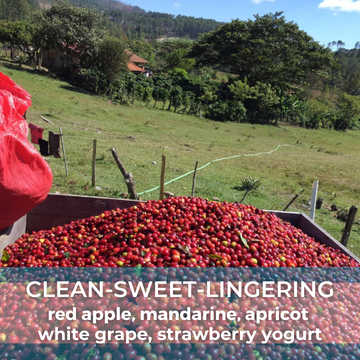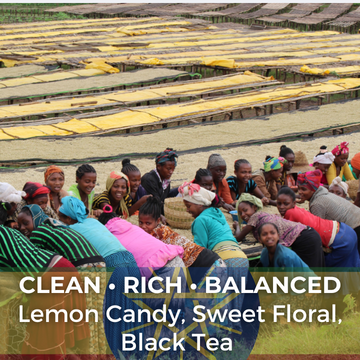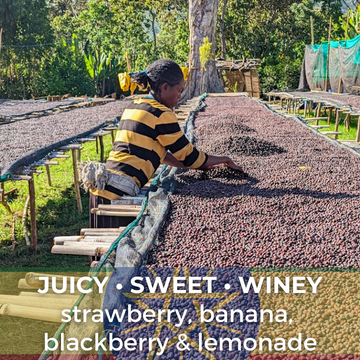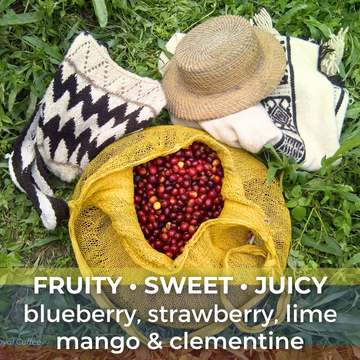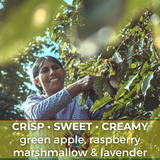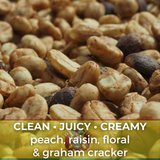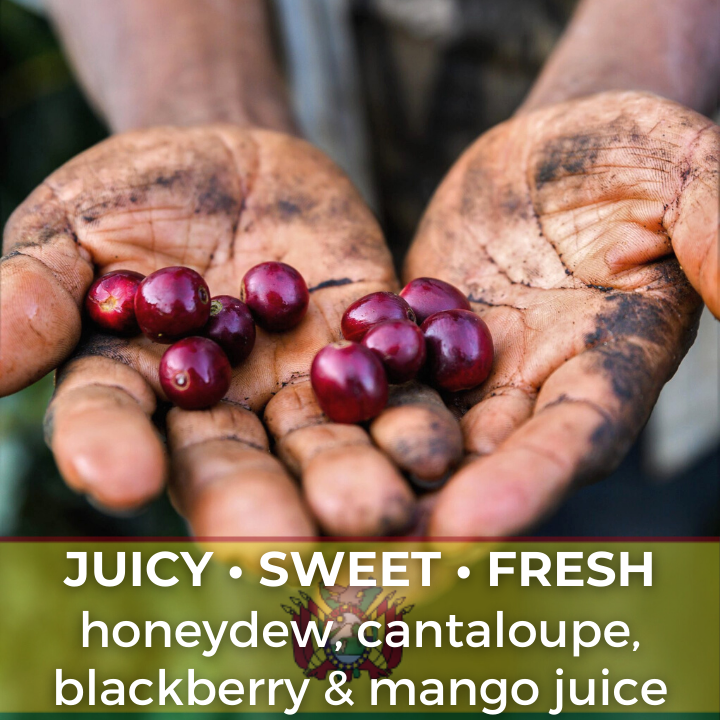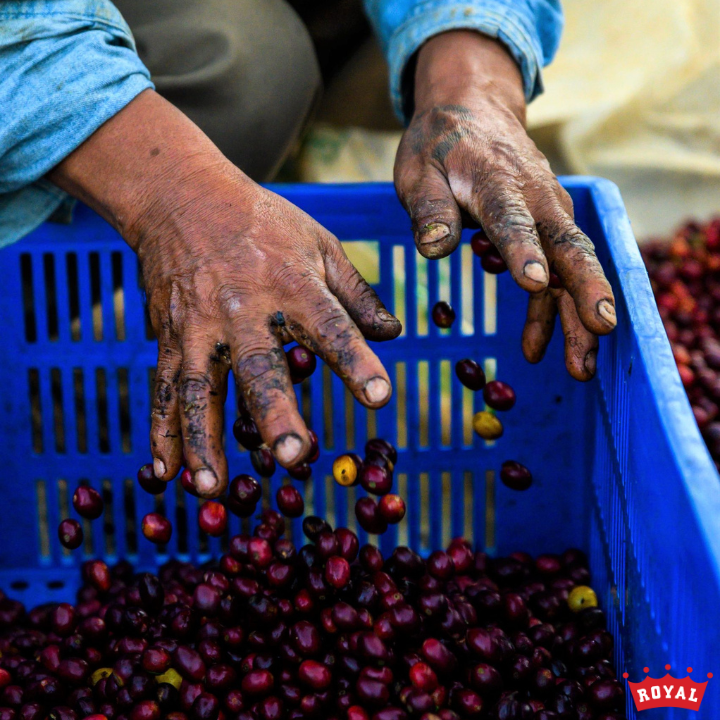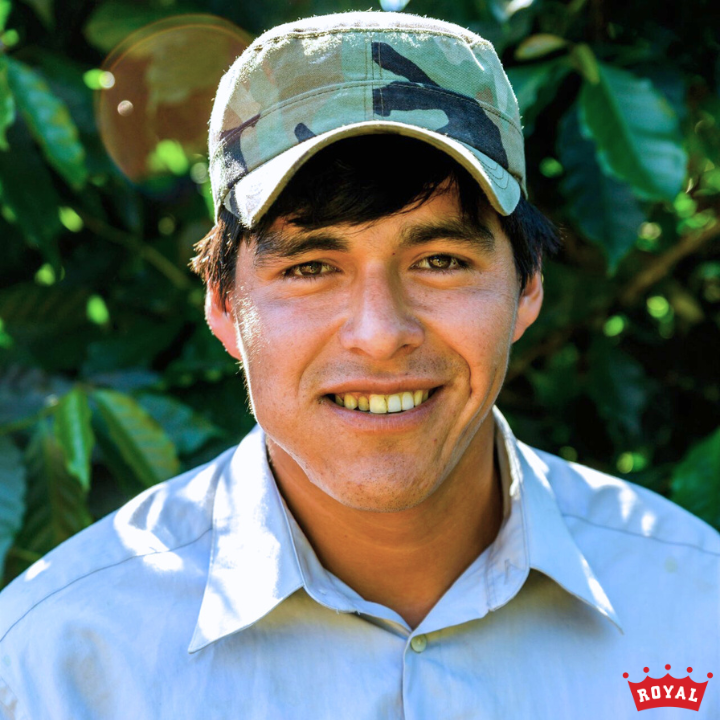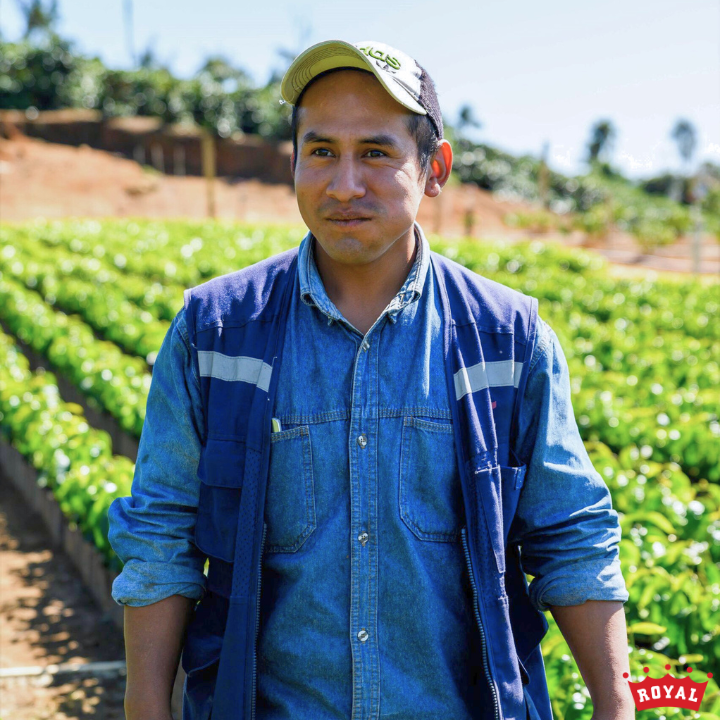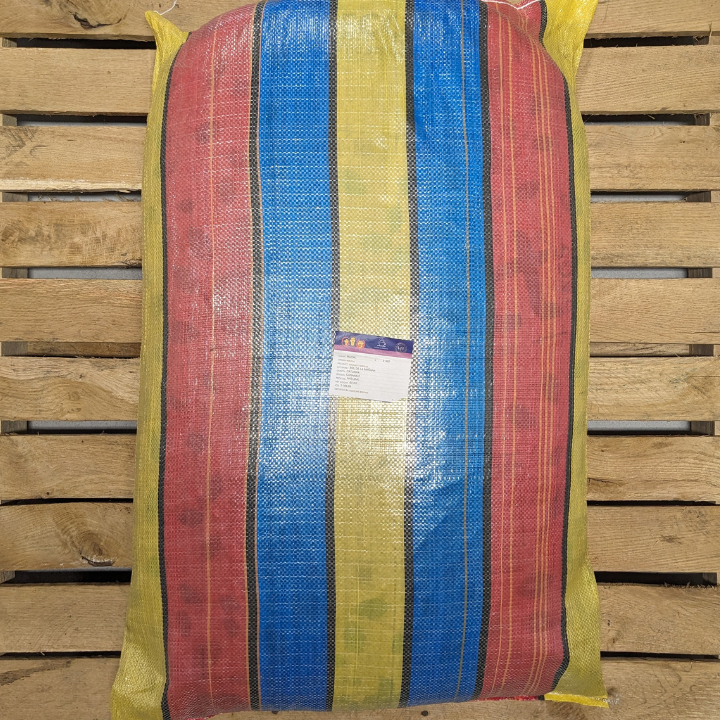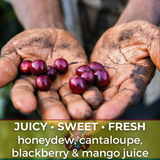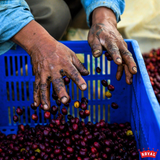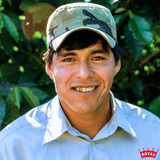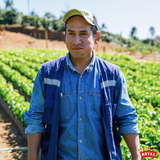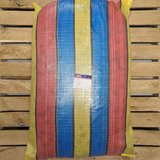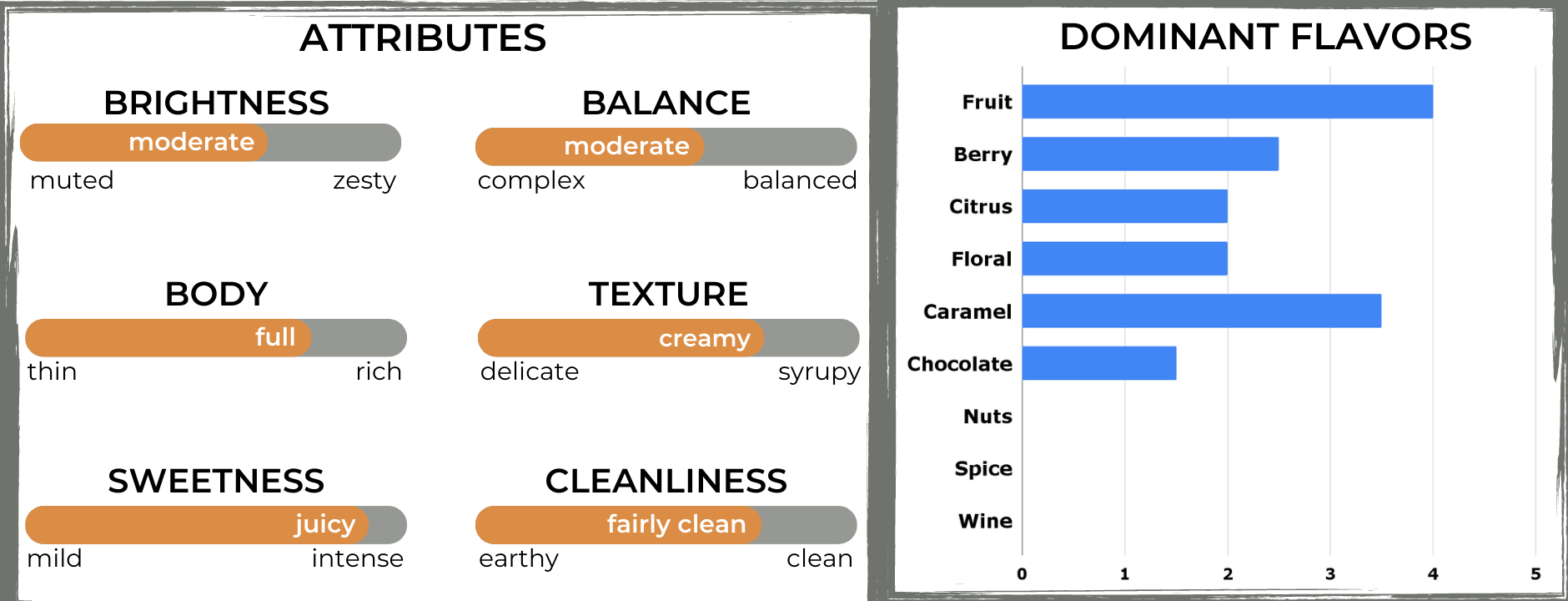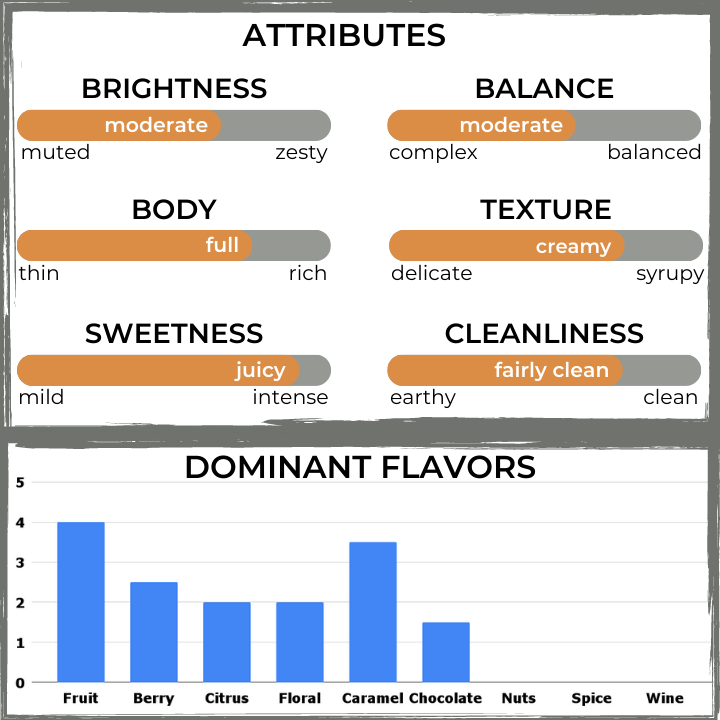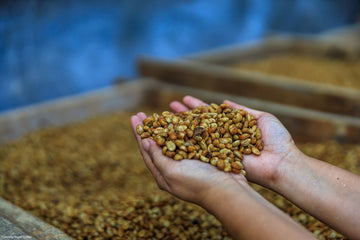Bolivia Caranavi Sol de la Mañana Caturra Natural
This delicious coffee is a natural processed, caturra only micro lot provided via Agricafe's Sol de la Mañana smallholder program from the Caranavi region of Bolivia. It's moderately balanced and bright, full bodied, with a creamy texture and juicy sweet! We noted fresh, ripe honeydew, rich cantaloupe, juicy mango, blackberry jam and a hint of cocoa. If you’re a fan of juicy, fruity naturals, this one is STELLAR!
Bolivia is a coffee origin that doesn’t get nearly as much attention as it deserves. As South America’s only landlocked coffee producing country, Bolivia is also the smallest exporter of coffee on the continent. Maybe that’s why it doesn’t get much attention, it’s pretty hard to find! Now imagine finding a premium, natural processed, caturra only micro lot that’s been hand selected from small family farms by one of the most respected exporters in Bolivian coffee. Let’s just say we’re super excited to have found this needle in the haystack!
There’s a lot to love about this coffee, not least of which is Pedro Rodriguez and his Sol de la Mañana smallholder program, but we’ll focus on the coffee here and leave the “Farm Bio” section all for him! The short version is that his Sol de la Mañana program is focused heavily on micro lots and this particular micro lot features the Caturra variety. Caturra is a natural mutation of Bourbon and we’ve found they share many of the same cupping qualities: balanced, sweet, bright and clean with good body. This also makes Caturra an excellent candidate for natural processing which brings out its sweetness without sacrificing too much brightness and the cleanliness of the cup.
Speaking of natural processing, if you’re a fan of juicy, fruity naturals like me, this one is STELLAR. The first note we got in the cup was fresh, ripe honeydew which transformed into rich cantaloupe as our cups cooled. Next up was tropical fruit and which tropical fruit it is exactly depends on who you talk to. Between us papaya, star fruit and even banana was mentioned but the common one was definitely juicy mango. We also noted blackberry jam and an undercurrent of cocoa. The consensus on this coffee is clear: fresh, clean, sweet and jam packed with juicy fruit!
Reminder! This coffee is raw, you must roast it before brewing
Arrival Date: July 21, 2023; US Arrival: June 2023, packed in GrainPro.
Acidity & Brightness: Moderate brightness and intensely sweet
Balance & Finish: Moderately balanced and fairly clean finish
Body & Texture: Full bodied and creamy texture
Flavors: Honeydew, cantaloupe, blackberry jam, mango juice & cocoa
Grade: SHG, grown at 1450-1650 masl
Processing: Full natural and dried on raised beds
Grower: Smallholder farmers organized around Agricafe
Region: Caranavi province, La Paz department, Bolivia
Varietals: Caturra
Recommended Roast Range: City to Full City (light to medium)
We like this coffee best at City + or as first crack is slowing down. Lighter roasts will add bright acidity, think slightly under ripe fruit with a bit of floral thrown in. Though you’ll miss a bit of body. Closer to medium, or between 1st and 2nd crack, you’ll bring out more rounded sweetness, think jam rather than fresh fruit. You’ll also begin to miss some of the more subtle melon notes in favor of more mango and chocolate as well as a touch more body. Despite the natural processing, we found this coffee very easy to roast. Your mileage may vary of course but for us it was almost like the coffee was doing its own heat management. It just wants to coast into development and all you have to do is decide how “done” you want it!
Royal Coffee - “Roasters fall into two categories when it comes to Boliva's coffee: those that know, and those that don't know. For those who know, Agricafe is one of the most sought-after producer groups not just in Bolivia, but in all of South America, and buyers line up every year for their one-of-a-kind microlots. For those who don't know, it is often the cup qualities—diverse, fascinating, unexpectedly delicious—that grab their attention for life.
This year in addition to our regular direct trade imports we have curated a group of microlots from Agricafe's close-knit farm network for our own inventory. This lot, a natural process caturra from smallholder farmers working with Agricafe throughout the Caranavi highlands, is super sweet with peach candy, orange cake, and mango juice.
Caranavi and its Coffee
Bolivia is South America's only landlocked coffee producing country and is the smallest exporter of coffee on the continent. The quality of that coffee, however, is hardly lacking in diversity or beauty. Bolivia’s terrain and geography is gifted for arabica production, particularly throughout the Yungas region (Yungas is Aymara for "warm lands"), whose mountain ranges connect the low and humid Amazonian basin to the dry Andean altiplano above. The most productive municipality in the Yungas is by far Caranavi, which still produces an estimated 85-90% of Bolivia's specialty coffee.
Caranavi's landscape is steep, humid, rugged, and remote, with natural forest making up more than 90% of the territory. Historically coffee in this area was challenged by a devastating combination of isolation and national disinvestment. These days, after decades of struggle, coffee farms in Caranavi's high and tropical climate tend to be well-managed and diversified, but small. Coffee growers here still often don’t have processing equipment or transportation of their own, a massive hurdle in such territory, making Agricafe’s investments over the past 10 years an enormous benefit to many.
Agricafe and the Rodriguez Family
Specialty groups like Agricafe deserve a lot of credit for their dedication to Bolivia's coffee potential, despite the odds. Agricafe was established in 1986 as a passion project by Pedro Rodriguez, who at that time was a banker whose love for coffee led him to start a small commercial grade exporting business. In 2012, 26 years later, Rodriguez acquired land of his own in Caranavi. This part of Bolivia had for decades been populated with indigenous smallholder coffee farmers, but after suffering multiple waves of disinvestment by the government the population was shrinking, and coffee in particular was close to extinction. Rodriguez’s original farm, “La Linda”, was meant to take advantage of affordable land in the area and to demonstrate to local smallholders how productivity could be increased for their benefit. Now, 10 years after La Linda was built, the family business includes 12 family farms between Caranavi and Samaipata, to the south, and a group of 100 smallholders who together comprise Agricafe’s “Sol de la Mañana” program. Pedro’s daughter Daniela and son Pedro Pablo are also part of the business, managing commercial operations and farmer training.
Sol de la Mañana
Agricafe's smallholder farmer program, “Sol de la Mañana”, began in 2013 with only 10 small producers in Colonia Bolinda, a farming community just up the mountain from Caranavi town and the same neighborhood where La Linda was established. Sol de la Mañana functions like a school, using a 10-year curriculum focused on best practices for nursery and farm management, plant nutrition, renovation, specialty harvesting, and biodiversity. This granular attention to detail forced willing smallholders to take charge of their productivity and quality, and to think long-term. When the first commercial harvest was sold in 2017, the success of the program attracted more producers. It currently has 100 contributing farms and production for most has increased from a per-hectare average of 2-4 bags to over 20.
Central Processing at Agricafe
All coffee from Sol de Mañana producers is processed centrally at Agricafe’s wet mill in Caranavi town. Processing here has come to reflect the innovation and attention to detail that the Rodriguez family seems to exude against all odds for such a remote location. Cherry from Sol de la Mañana producers is collected each day at the farms and delivered to the wet mill in the evenings. Cherry is carefully sorted on arrival, and then, since every cherry delivery is treated as a unique microlot, it’s processed according to what Agricafe’s quality managers decide is the best pairing for a particular farm, cultivar, time of year, and in many cases buyer specification. Natural process coffees, like this caturra lot, are washed and transferred immediately to a combination of covered raised beds and various types of mechanical dryers (Agricafe has a veritable collection of mechanical drying formats).
Due to the area’s constant humidity and blazing hot days, drying is almost entirely mechanical, which, like their enclosed fermentations for washed coffees, is done for the sake of control and protection of the coffee’s delicate qualities. Agricafe produces washed, natural, honey, anaerobic natural, and experimental fermentations using coffee fermentation must, all in a very compact production space. A full harvest at Agricafe’s wet mill generates about 3,000 unique lots of coffee, which are then recombined by their cuppers or buyers to create larger lots, or in many cases marketed separately as microlots."
